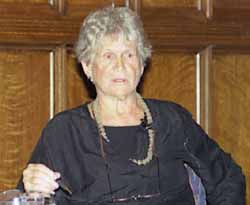TC BookTalk: Deborah Meier
She's a teacher who doesn't care about tests. She is interested in the data they can provide, but she said tests are harmful if we think they mean something they don't. But it's not only tests that author Deborah Meier challenges, she wants to know if the public can trust its schools.
On September 24th, Meier spoke at the TC BookTalk to a packed audience in the Milbank Memorial Chapel. She spoke about her new book, In Schools We Trust: Creating Communities of Learning in an Era of Testing and Standardization.
In her book and at the lecture, Meier talked about her vision of trustworthy public schools and how it underscores their role as essential elements in a democratic society. She discussed the major features that all good schools share and shows how standardized curricula and tests discourage exploration and understanding while undermining learning environments built on trust.
"We can't trust schools like we would trust God," she said. "We need faith in the capacity of ordinary humans to be trustworthy, but not a blind faith. There will be many questions and doubts. We need to look at people's motivations and drives-the messy stuff in the heart of a democratic debate."
Meier has spent more than three decades working in public education as a teacher, writer, and public advocate. She began her teaching career in the mid-1960s as kindergarten and Headstart teacher in Chicago, Philadelphia and New York City schools. She was founder and teacher-director of a network of highly successful public elementary schools in East Harlem.
The first school, Central Park East, opened in the fall of 1974 and remains an innovator in education under its two subsequent principals. In 1985, she founded and was principal of the Central Park East Secondary School, a New York City public high school also in east Harlem, in which more than 90 percent of the entering students went on to college, mostly to 4-year schools. Today, she is founder and co-principal of the Mission Hill School, a K-8 Boston Public pilot school serving 180 children in the Roxbury neighborhood.
Drawing on her experience in founding and running small, successful public schools in New York and Boston, Meier argues for a dramatic reinvention of public schools based on an older tradition in which adults kept meaningful company with children. She talks about children who have been set adrift from the adults in their lives, both in and out of school, how trust works within a school, and why such trust is essential in developing educative relationships between teachers and students. Kids need to see how adults talk, argue and compromise with each other, she said.
"Young people still would like to be in the lives of grown-ups," said Meier. "Schools need to take advantage of this and use this as the one thing that the media do not have."
Adults need to have the chance to get to know kids both inside and outside of schools. When it came time for Meier's son to get recommendations from his high school teachers, none of them knew him well enough to write one. She compared this to her Central Park East School, where each child knew several adults well. In addition, she notes, parent participation is important. Teachers and parents can become allies in bringing up children. She doesn't blame teachers, though. She says schools are too big, but the big buildings could be broken up differently so that classes are smaller.
"I do think that if everyone in positions of power had to send their kids to public schools, then they might change," said Meier to a cheering crowd.
Instead of changing the schools, the administration is pushing for higher test scores. "We've settled for test scores because the debate is hard," she said.
However, there can be a compromise between test scores and standardized tests, she said. They give teachers and parents an interesting piece of data in the large sense, but a diploma should be given after a range of data is collected. Part of that range could be test scores. She worries that people lose a sense of reality when looking at test scores. For example, if a child doesn't do well on a reading test that means that he or she can't read.
Almost nothing that these kids are tested for would be on a list of things that they need, aside from the credential. "People closest to this issue-closest to the action-need to make these decisions," said Meier. "It could lead to a lot of trouble, but we need to address this."
"It's not healthy for kids to hear, 'I didn't make the rules, but we have to live by it,'" she said. Family and teachers need to make the significant decisions in education so that they can help make the rules they have to follow.
Published Thursday, Feb. 27, 2003
